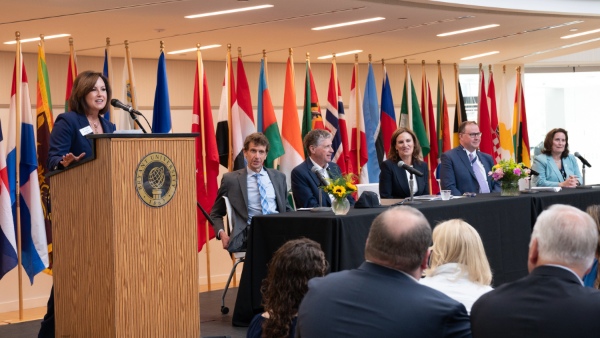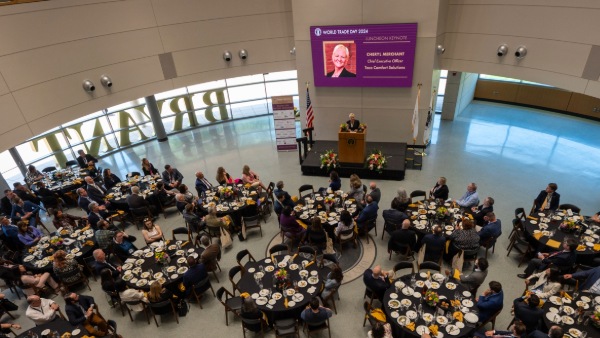The strength of a supply chain relies on its diverse components working together toward a common goal. The 38th World Trade Day, presented by Bryant University’s John H. Chafee Center for International Business, brought together educators, business experts, representatives from state and national government, and at least one physicist to examine ongoing issues surrounding global supply chains, travel, and innovation.
One of the largest events of its kind in the region, World Trade Day provides an opportunity for attendees to engage in in-depth discussions on current global issues. "People want to collaborate, they want to share ideas, and they want to hear from others," noted Eva-Marie Mancuso, director of the Chafee Center, which has been a resource for Rhode Island businesses, as well as global businesses, students, and individuals interested in global trade, for more than 40 years.
“Today is about putting together a community and I hope everyone comes away from the event with the idea that we're a team,” said Mancuso. “We are the biggest little state in the nation, and sometimes you need an entire region to accomplish things."
World Trade Day is a longstanding tradition at Bryant, and the ideas shared, and connections forged there, have a lasting impact, noted Bryant University president Ross Gittell, Ph.D., in his opening remarks. “We all know that there are many challenges to international trade — and those challenges have increased recently,” said Gittell. “But along with the challenges come opportunities, and that's why we need to convene sessions like today’s to learn from each other and explore opportunities to do things differently.”
In his own remarks, Rhode Island Governor Daniel McKee donned a Bryant baseball hat and noted how events like World Trade Day, and the connections it represented, embodied the state’s efforts to broaden its reach and secure a brighter future for all. “Today, we're making sure we're doing everything we can to connect Rhode Island with the rest of the world,” he noted. “We're planting seeds around the state of Rhode Island and they’re growing.”
Here are a few major takeaways from the day:
1. Custom fit is the right fit
David Neeleman, CEO of Breeze Airways, kicked off the day with a wide-ranging morning keynote. Breeze, he noted, was always a company with a mission. “I saw a trend develop that was good for the big airlines but not great for the traveling public,” Neeleman noted. “In airports like T.F. Green in Providence and others, the big airlines were consolidating. They were strengthening themselves; they were merging, they were becoming powerful — and not only were their fares going up but the travel options for the traveling public were less and less.”
That’s where Breeze found its purpose, he said: bringing efficient and affordable options back to flyers.
“The secret to our sauce is that we fly where nobody else flies,” noted Neeleman, who would go on to announce a major expansion of routes at Rhode Island's T.F. Green International Airport later that afternoon.
It’s that desire to discover new ways of doing business that has inspired him throughout his storied career, said Neeleman. “I've always been kind of an innovator, and when I first started, I was in an industry where there wasn’t much innovation.”

2. Logistics finds a way
A panel discussion on resilient gateways, moderated by Michael Gravier, Ph.D., professor of Marketing and Supply Chain Management, brought together experts across an array of supply chain elements, from shipping to aviation. Much of the discussion centered around managing uncertainty in a chaotic world.
Perhaps the ultimate test in that area came in the form of the COVID-19 pandemic. But even in the face of a never-before-seen global emergency, Jorge Barnett Lawton, managing director of the Georgia Tech Panama Logistics Innovation and Research Center, suggested that people and supply chains have the power to rise above the chaos. “We noticed that organizations have a natural ability to adapt, that sometimes doesn't get exploited unless there is a massive stress. And during that period of stress, we saw everybody aligned — there was a common enemy, you could say,” he stated.
From adopting new ways to communicate to reimagining long-standing practices, Lawton said, supply chains found ways to reinvent themselves. “Risk is a huge opportunity for reassessing how we work. Not only how we operate, but how our culture of work, or our capability, innovates.
“It’s like that quote from Jurassic Park: ‘Life finds a way,’ he said with a smile. “Logistics always finds a way.”
3. Saving the planet is as complicated as it seems
In a Q-and-A session after the discussion, an audience member asked about the role sustainability played in the panelists’ work. Paul McDevitt ’24MBA, senior director of supply chain management for Toray Plastics, admitted there were no easy answers. “I'm an environmentalist who works at a plastic company,” he noted, to a few chuckles.
But the needle is starting to move across all supply chain-related industries, he suggested. “What we're seeing in our space is more and more people are raising their hands and saying, ‘We need to do something, so how are we going to go do it?’ The large players in our customer base are starting to put their money into sustainability.”
The challenge, McDevitt noted, is serving the customer while still serving the planet: “A consumer wants to get what they always have and not have to think differently about how many times a day an Amazon truck is driving around their neighborhood. So, I think it's a little bit of a balancing act.”
4. With the right partners, you can change the world
Afternoon keynote speaker Cheryl Merchant, CEO of Taco Comfort Solutions, shared the lessons she’d learned over the course of her four decades in supply chain management. “I'm going to tell you, number one: Get rid of the word ‘suppliers.’ They need to be partners,” she advised. “If they are not partners, you will fail.”
In a fast-paced industry where a single mistake could potentially cause far-reaching damage, working together is a must, said Merchant. “There is only one boat, and we are all in that boat. It does you no good to say, ‘Hey, man, your end of the boat is leaking.’ Because if the boat goes down, everybody is in it,” she stated. “What I'm telling you now is get your partners in the boat. They need to know where you're going, the speed you're going at, what your plan is, and how it's going to happen.”
Merchant also challenged the attendees to find ways to work together in difficult times, and to do the kind thing instead of the selfish thing that looks profitable in the short term. “At the end of your career, when you're not working anymore, how do you want to be remembered?” she asked the audience.
“When you have partners, you can change the supply chain, you can make a difference, you can change the world, and you become the preferred supplier,” Merchant argued.

5. With great power comes great challenges
The day’s three breakout sessions examined key issues facing global commerce as well as the resources businesses could take advantage of to support their efforts. In “AI’s Impact on Supply Chains— From New Tech to Cyber Threats,” Bryant University Executive in Residence June Youngs moderated a discussion with Kevin Ricci '94, a partner in Citrin Cooperman's technology, risk advisory, and cybersecurity (TRAC) team, and Aida Ahmadzadegan-Shapiro, Ph.D., a quantum physicist, and the founder and CEO of ForeQast, a company at the cutting edge of quantum computing and artificial intelligence in logistics.
Ahmadzadegan-Shapiro suggested that artificial intelligence could be a boon to the supply chain industry, pointing to a pilot program her company had conducted with one of America’s largest retailers, where AI-powered adjustments to their routing suggested savings of more than $20,000 a month.
She also suggested that artificial intelligence could also help organizations adapt on the fly, noting the recent collapse of Baltimore’s Francis Scott Key Bridge and suggesting that AI solutions could have helped to lessen the impact of the sudden loss of a major transportation route.
Ricci, however, argued that these advances come at a cost. There are alarming cybersecurity concerns related to AI, he stated, and the damage could be especially devastating in the supply chain sphere, where breaches could give the criminals access to far-reaching networks of connected companies.
Rapidly advancing AI, Ricci suggested, could be used — and is being used — in everything from increasingly sophisticated “phishing” and social engineering schemes to access confidential information to programming adaptive malware to synthetic “deepfake” media that could be used for all sorts of nefarious purposes.
“Ironically, I feel that we're rapidly approaching the day when we're going to need good AI to protect ourselves,” he suggested.
6. Success takes flight through working together
In his closing keynote, Billy Thalheimer, CEO and founder of seaglider company REGENT, discussed his goal of drastically reducing the cost and headache of regional transportation between coastal cities through the introduction of new wing-in-ground-effect craft. Echoing the theme of the day, he suggested that regional connections have helped his company to soar.
“We're really excited to be here in Rhode Island, not only for the talent that we found here, but also the infrastructure,” stated Thalheimer, noting that Quonset Development Corporation has been an “incredible partner,” and that the state’s coastline was a fantastic testing ground.
Thalheimer concluded his talk by asking to watch for REGENT’s success in the future — both literally and figuratively. “Just so everyone knows, when you see a seaglider on the water later this year — that's us. It’s normal, and it will become the new normal.”